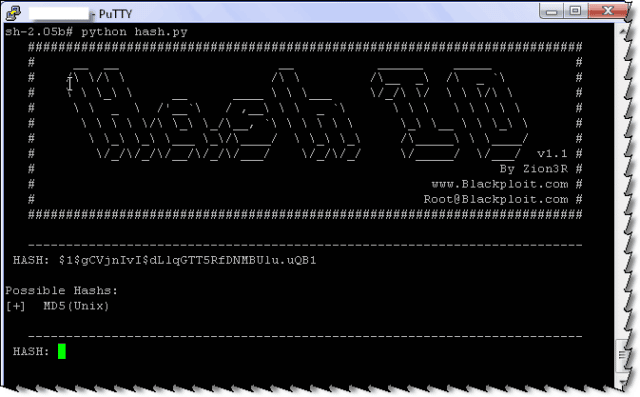Hash Identifier or HashID is a Python-based tool that allows you to quickly identify types of hashes used to encrypt passwords. It supports over 220 unique hash types using regular expressions.
Somewhat similar to HashTag – Password Hash Type Identification (Identify Hashes) – which we posted about a while back.

It is able to identify a single hash, parse a file or read multiple files in a directory and identify the hashes within them. hashID is also capable of including the corresponding hashcat mode and/or JohnTheRipper format in its output.
Hash Identifier – Identify Types of Hashes
It supports a whole bunch of hashes such as (but not limited to):
- ADLER-32
- CRC-32
- CRC-32B
- CRC-16
- CRC-16-CCITT
- DES(Unix)
- FCS-16
- GHash-32-3
- GHash-32-5
- GOST R 34.11-94
- Haval-160
- Haval-192 110080 ,Haval-224 114080 ,Haval-256
- Lineage II C4
- Domain Cached Credentials
- XOR-32
- MD5(Half)
- MD5(Middle)
- MySQL
- MD5(phpBB3)
- MD5(Unix)
- MD5(WordPress)
- MD5(APR)
- Haval-128
- MD2
- MD4
- MD5
- MD5(HMAC(WordPress))
- NTLM
- RAdmin v2.x
- RipeMD-128
- SNEFRU-128
- Tiger-128
- MySQL5 – SHA-1(SHA-1($pass))
- MySQL 160bit – SHA-1(SHA-1($pass))
- RipeMD-160
- SHA-1
- SHA-1(MaNGOS)
- Tiger-160
- Tiger-192
- md5($pass.$salt) – Joomla
- SHA-1(Django)
- SHA-224
- RipeMD-256
- SNEFRU-256
- md5($pass.$salt) – Joomla
- SAM – (LM_hash:NT_hash)
- SHA-256(Django)
- RipeMD-320
- SHA-384
- SHA-256
- SHA-384(Django)
- SHA-512
- Whirlpool
Hash Identifier aka HashID Usage
|
1 2 3 4 5 6 7 8 |
$ ./hashid.py [-h] [-e] [-m] [-j] [-o FILE] [--version] INPUT INPUT input to analyze (default: STDIN) -e, --extended list all hash algorithms including salted passwords -m, --mode show corresponding hashcat mode in output -j, --john show corresponding JohnTheRipper format in output -o FILE, --outfile FILE write output to file (default: STDOUT) --help show help message and exit --version show program's version number and exit |
You can download Hash ID v1.1 here:
Or read more here.
